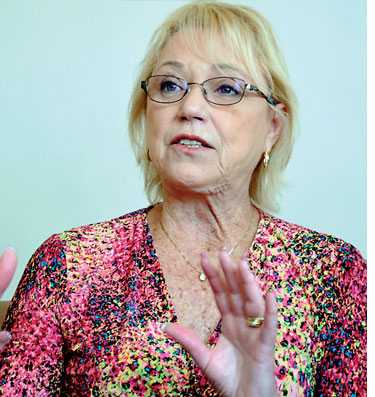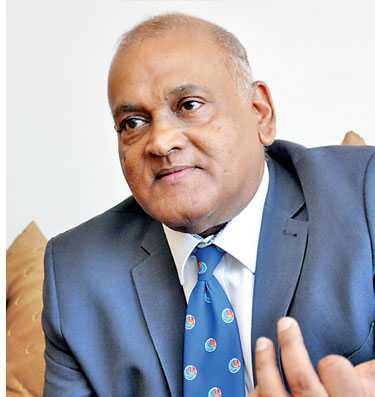Tuesday Feb 17, 2026
Tuesday Feb 17, 2026
Thursday, 18 April 2019 00:00 - - {{hitsCtrl.values.hits}}
 |
 |
Rotary Foundation Trustee Brenda Cressey |
Rotary Sri Lanka District Governor-Elect Dushan Soza |
By Divya Thotawatte
Rotary Foundation Trustee Brenda Cressey, an icon in the fundraising arena, recently visited Sri Lanka in order to participate as the Chief Guest of the 28th Rotary Conference which is to be held today at the Presidential Suit at the Galadari Hotel. Together with Rotary Sri Lanka District Governor-Elect Dushan Soza she shared insights on the Rotary Foundation and her opinions on the performance of Sri Lanka. Following are excerpts of the interview:
Q: Globally we see that the economy is contracting; are you seeing an impact on the money’s organisations and people donating funds to the Rotary foundation?
Brenda: The way I look at it with the economy around the world, it is changing. The demographics are also changing and this is why we have such emphasis on bringing in new and younger Rotarians, so that the levels of span we have in Rotary, spans across many areas. We look at maternal and child health, disease prevention, polio eradication is our main goal and focus and we won’t quit that. We have something in Rotary for everyone to look at and consider as far as striving for humanitarian assistance.
The economy is contracting, but we do a wonderful job in supporting our Rotary clubs with their projects and allowing the money that is given to the Rotary Foundation to come back to the community and for the Rotary clubs to do specific projects in their own areas, and we see that impact from a personal level can make it more appealing to Rotarians to support the Rotary Foundation and all the projects that Rotary does. We work with the UN, UNICEF and WHO. Also, our biggest partner is Bill Gates because he’s really interested in education and health, etc. and when you have a partner like that, it tells the world what Rotary is doing.
Q: Is this your first visit to Sri Lanka? Were you aware that Sri Lanka is ranked No. 1 by Lonely Planet and a must-visit destination?
Brenda: It is my first visit to Sri Lanka ad I was not aware that it was ranked first place by Lonely Planet until I got on the plane. But a lot of people travel to Sri Lanka, and a lot of people in my district have projects here, to build schools, etc. Moreover, Sri Lanka has been an inspiration for us to implement various projects in other countries. We are also working with the Nigerian government to get support to implement the cervical cancer project which was firstly started by Sri Lanka. It is incredible to think that a small country could lead the way around the world to make such a difference. We’re very proud of what happens here in Sri Lanka.
Q: Given that Rotary Sri Lanka has moved to a corporate way of running a business, what are the clear changes you have seen in Sri Lanka on the way they run projects in Sri Lanka with foundation funding?
Dushan: We have brought in a new level of governance to manage 70 Rotary clubs across the country which are highly diversified by Rotary members of all ages and races. Along with that we also have the Rotaract and Interact movement. We need to govern the population we have, because there are over 2,000 Rotarians in the country. To bring all of them together we have set up a strategic plan, and within the strategic plan, a framework has been created that sets up performance monitoring based on the goals we that we have set. It is spread across the country and we have automated the backend of Rotary, so that when all the reports come in, we can coat all this and manage it in a very effective manner. At the snap of a finger, we see the entire country based on how many projects we have done, what the total investment is, who the beneficiaries are in the focus areas and, how many man hours our Rotarians have spent. The information we obtain will help us to peak the performance of Rotarians moving forward.
At the moment some of the statistics coming out reveals that a Rotarian spends 10% of his productive time on Rotary. The business intelligence they call it in the corporate world, we call it the Rotary intelligence that has come out now that will help us to govern the district better.
Q: What are the key projects Sri Lanka is driving as at now and how do you ensure it is achieving the set key performance indicators?
Dushan: We have been working with the Government on a project to eradicate cervical cancer from the country. Rotary recently signed the MoU with the Ministry of Health to address the issue of cervical cancer in Sri Lanka. Our plan is to be declared as the first country that is rid of cervical cancer in the near future. The Government has launched an immunisation vaccine for little girls of the age of 11 and it is only when you’re 35 that you will see its results. It’s a long term project and we use the Rotarians’ help to promote this.
Another thing that we are working on is the disaster management projects amongst the Rotarians where we are setting up one Rotary club as the lead club. Every year, when the monsoons hit up, there is always a case of floods somewhere in the country where the whole country mobilises, but that is reactive. Now we want to be proactive and have a process ready where as soon as you press the button we’re able to mobilise all the Rotarians.
Furthermore, a project that I’m personally excited about is ‘Master Speller’ which is a spelling contest across Sri Lankan schools and over 200,000 students took part in this and we have the tournaments in zonal, district and national levels to promote spelling in all schools including in ones of the rural areas and to uplift English standards in the country.
Q: What are the problems that you have in terms of implementing projects?
Brenda: We have a very high rating for implementation. That is mainly because of our structure which is a volunteer structure. Our cadres look into the projects carried out by these volunteers to see that they are carried out well and, if they see anything that needs attention they bring it to our staff and we work with Rotary clubs and districts to get beyond those challenges. A lot of times the projects don’t go as planned but along the way the clubs have a lot of support to help them develop their project to do community assessment to make sure we’re doing what the communities need and not what we want to do.
Dushan: One of the problems that we face when working with Government organisations is that we have multiple agencies handling a particular subject. For example, if we talk about dengue, there’s the Dengue National Control Unit in Narahenpita, then there is the public health system that is running separately inside the municipalities and then there is the Ministry of Health governing it. When there are multiple stakeholders, we sometimes find it difficult to bring them together to drive in a certain direction. Each organisation may have strategic plans which differ from the others and when Rotary comes in, we have to bring all organisations to the same table in order to drive something in a certain direction.
Q: We have heard from the governor that Rotary is the best non-governmental entity for running business projects; what is your view on this?
Dushan: This is the only organisation that when you contribute money, it comes back to the same location 10 times larger the size. Rotarians contribute to the Foundation whatever they want to contribute and in a three years cycle, 50% of whatever you contribute is given back to the district. That is to do local projects and on top of that, using that money and using money from Rotary clubs from around the world we can apply for Foundation grants to work on large projects.
Brenda: Rotarians are true advocates and there is a lot of advocacy going on not only in Sri Lanka but around the world working with the government, with different agencies. We do many humanitarian projects with different areas of focus. Last week I had a meeting at the headquarters about Rotarians wanting to contribute more to the environment. We have six areas of focus and each one will support environmental projects in our communities which we think will be appealing to the younger Rotarians and the Rotaractors around the world because they like making a difference and that is how we engage all of our Rotarians to consider staying in Rotary because they can do things they want while making the biggest impact.
Q: How do you monitor projects globally when sitting in Evanston, for instance, a project done in outskirts of Sri Lanka that is funded globally?
Brenda: The process to do the projects is online. We have guidelines to what can be done and what cannot be done within the project structure. Before the project has even been approved to be implemented, you have to go through many different categories. Community assessment, what can be done within the project, the scope of the project and what cannot be done. Once the project is completed we always have feedback from the Rotaract community as to how impactful the project was, but for the larger projects there is the Rotaract cadre coming in to assess their impact on the community.
Dushan: The whole process of covering and administering 1.2 million Rotarians in 220 countries; they’re all brought into a single automated platform. The whole application process, evaluation process, authorisation process and the submission of your completed project is online which is very easy for all Rotarians to create any project they want.
Q: How do you see the future of Sri Lanka towards Rotary, as some of the key positions in Rotary globally have attracted some of the best talent from Rotary Sri Lanka?
Brenda: I think the future will be very positive because Sri Lanka is leading the way in many ways with different projects that they are doing, such as the cervical cancer project that I spoke about earlier.
Dushan: We have also looked into developing the next generation of leaders. We will be launching an emerging leader competition next month amongst the Rotaractors. This is the first time we’re doing that and we’re looking at identifying and developing the next generation of Rotaract leaders through such initiatives. That will be the first step and based on its success we will look at running it as a national project. It’s a complex thing to do and that is why we’re still restricting it to the Rotaractors.
Pix by Lasantha Kumara